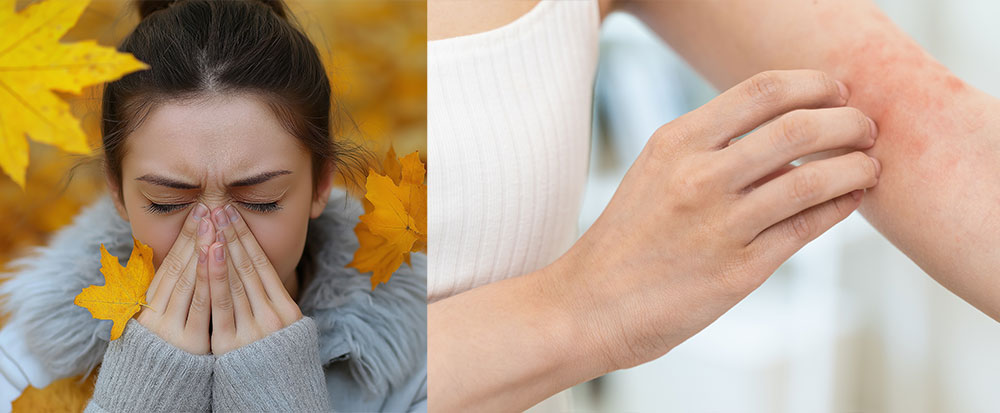Seasonal Allergies & Your Skin: What Connecticut Sufferers Need to Know
If you live in Connecticut, you know how quickly the seasons can change—and with each shift, many people experience itchy eyes, congestion, and sneezing. But did you know that seasonal allergies can also affect your skin? From dryness and hives to eczema flare-ups, allergy season can leave your skin feeling irritated and inflamed.
Here’s what Connecticut residents should know about managing skin allergies, rashes, and irritation caused by pollen and other seasonal triggers—and when it’s time to see a dermatologist.
How Seasonal Allergies Affect the Skin
Allergies don’t just impact your sinuses—they can also trigger immune responses in your skin. Common skin reactions include:
- Itchy, red, or irritated skin
- Hives or welts (also called urticaria)
- Eczema flare-ups (also called atopic dermatitis)
- Dry, flaky patches
- Swelling around the eyes or face
These reactions occur because allergens like pollen, mold spores, and grass prompt your body to release histamine, leading to inflammation, redness, and itching.
For many Connecticut residents, spring and fall are the peak allergy seasons, especially when tree pollen (spring) or ragweed (late summer and fall) counts are high.
Read more about detmatitisConnecticut’s Most Common Skin Allergy Triggers
Different parts of Connecticut experience slightly different allergen patterns, but some triggers are common statewide:
- Tree pollen (oak, birch, maple) in early spring
- Grass pollen in late spring and early summer
- Ragweed pollen in late summer through fall
- Mold spores after rainy weather or in humid areas near the shoreline
Even indoor allergens such as dust mites and pet dander can worsen skin irritation during colder months when windows remain closed.
How to Protect Your Skin During Allergy Season
Dermatologists recommend a combination of prevention, gentle skincare, and medical treatment when needed.
- Cleanse gently:
Wash your face and any exposed skin after spending time outdoors to remove pollen and pollutants. Avoid harsh soaps—opt for fragrance-free, gentle cleansers instead. - Moisturize regularly:
Allergy-related inflammation can weaken your skin barrier. Apply a soothing, non-fragranced moisturizer daily to restore hydration and calm irritation. - Avoid scratching:
Scratching can worsen irritation and increase the risk of infection. Use cool compresses or over-the-counter anti-itch creams to relieve discomfort. - Shower before bed:
Pollen can cling to your hair and skin. Showering before bed helps prevent allergens from transferring to your pillow and bedding overnight. - Seek medical care when needed:
If your rash, eczema, or hives don’t improve with home care, a dermatologist can recommend prescription medications, antihistamines, or allergy testing to identify triggers.
When to See a Dermatologist in Connecticut
If your skin remains red, itchy, or inflamed even after allergy season ends, you may have a chronic condition such as eczema that’s being aggravated by allergens.
At Dermatology Physicians of Connecticut, our specialists treat all types of skin allergies and seasonal flare-ups. We have convenient offices located in Branford, Fairfield, Hamden, New London, Oxford, Stamford, Shelton, Norwalk, or New Haven .
We offer:
- Expert diagnosis for allergy-related skin reactions
- Treatment for eczema, hives, and rashes
- Customized skincare plans for sensitive or allergy-prone skin
FAQs: Seasonal Allergies and Your Skin
Q: Can seasonal allergies really cause rashes?
Yes. When your immune system reacts to pollen or other allergens, it releases histamine, which can lead to itchy, red patches or hives on your skin.
Q: How can I tell if my rash is from allergies or something else?
Allergic rashes often appear suddenly and improve when you avoid exposure to allergens. A dermatologist can confirm the cause through an exam or allergy testing.
Q: Are people with eczema more sensitive to seasonal allergies?
Absolutely. People with eczema have a weaker skin barrier, making them more prone to irritation and inflammation triggered by allergens.
Q: What’s the best treatment for allergy-related hives?
Antihistamines can help relieve itching, but if hives persist, your dermatologist may prescribe topical, oral, or injectable medications to calm inflammation.
Q: When should I see a dermatologist?
If your symptoms last more than a week, are spreading, or are interfering with daily activities, it’s time to schedule an appointment.
Expert Dermatology Care for Seasonal Allergies in Connecticut
At Dermatology Physicians of Connecticut, we understand how frustrating allergy-related skin problems can be. Our team provides personalized treatment plans for both children and adults, helping you find relief year-round.
With 9 convenient locations across the state, we make it easy to get expert skin care close to home.
Ready to find relief?
Schedule an appointment with one of our Connecticut dermatology specialists today.

